De Nederlandse schrijver en wetenschapper Hugo Brandt Corstius werd geboren in Eindhoven op 29 augustus 1935. Zie ook mijn blog van 29 augustus 2007 en ook mijn blog van 29 augustus 2008 en ook mijn blog van 29 augustus 2009.
Uit: Waarom God Van Frans Houdt
„Pascal (Clermont 1623-Parijs 1662) en Frans Kellendonk (Nijmegen 1951-Amsterdam 1990) hebben meer gemeen dan welk koppel van een Franse en een Nederlandse schrijver ook. Hun sociale afkomst, hun levensloop, hun schrijfstijl, hun levensprobleem, en hun oplossing daarvan, hun ziekte en hun dood vertonen opvallende overeenkomsten.
Er zijn natuurlijk ook verschillen. Pascal was ingenieur en filosoof. Kellendonk anglist en schrijver. Pascal was zijn hele leven ongelukkig – van Frans is mij dat niet bekend. Pascal is wereldberoemd, Kellendonk nog niet. Maar gezien de afstand van 330 jaren en 330 mijlen zijn de overeenkomsten frappant.
De jongen werd geboren in een goed-katholiek, welvarend gezin in een provincieplaats ver van de hoofdstad, waar hij later natuurlijk ging wonen en waar hij in aanraking kwam met stromingen die het traditionele rooms-katholicisme bestreden. Hij is de enige zoon – er zijn nog drie zussen, van wie er een veel invloed op hem heeft. Hij is duidelijk intelligent en krijgt een goede opvoeding. Al vroeg raakt hij – in kleine kring – bekend. Hij heeft venijnige vijanden. Zijn openbare leven is zeer beperkt. Hij blijft ongetrouwd en van enige belangstelling voor een lid van het vrouwelijk geslacht is nooit sprake. Aan het eind van zijn leven lijdt hij aan een ernstige ziekte waar geen kruid tegen gewassen is. Zijn dood is een verlossing. Die dood komt kort na zijn negenendertigste verjaardag.
Over welk onderwerp hij ook schrijft (ketterse opvattingen, kritiek op de wetenschap van de tijd), hij schrijft altijd kristalhelder, klassiek proza. Wat Pascal betreft: er zijn weinig Franse schrijvers uit de zeventiende eeuw die nog zo leesbaar zijn. Het zal me niet verbazen als dat in de drieëntwintigste eeuw ook over Kellendonk gezegd wordt.“
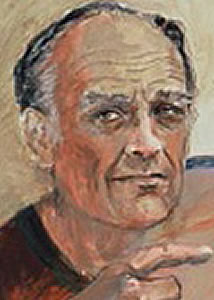
Hugo Brandt Corstius (Eindhoven, 29 augustus 1935)
Portret door Ine Laurant, 1997
De Engelse dichter Thomson („Thom“) William Gunn werd geboren op 29 augustus 1929 in Gravesend, Kent. Zie ook mijn blog van 29 augustus 2007 en ook mijn blog van 29 augustus 2008 en ook mijn blog van 29 augustus 2009.
Cat island
Cats met us at
the landing-place
reclining in the sun
to check us in
with a momentary glance,
concierges
of a grassy island.
(Attila’s Throne,
the Devil’s Bridge,
and “the best Byzantine
church in the world”,
long saints admonitory
on kiln-like inner walls.)
And lunch in a shady court
where cats now
systematically worked
the restaurant, table
by table, gazing into eyes
pleading “I’m hungry
and I’m cute”, reaching
front paws up to knees
and always getting
before zeroing in
on the next table, same
routine, same result.
Sensible bourgeois
wild-cats working
with the furred impudence
of those who don’t pretend
to be other than whores,
they give you not
the semblance of love
but simply
a look at their beauty
in return for food.
Models, not escorts.
They lack, too,
the prostitute’s self-pity,
being beyond shame.
And we lack
what they have.
My Sad Captains
One by one they appear in
the darkness: a few friends, and
a few with historical
names. How late they start to shine!
but before they fade they stand
perfectly embodied, all
the past lapping them like a
cloak of chaos. They were men
who, I thought, lived only to
renew the wasteful force they
spent with each hot convulsion.
They remind me, distant now.
True, they are not at rest yet,
but now they are indeed
apart, winnowed from failures,
they withdraw to an orbit
and turn with disinterested
hard energy, like the stars.
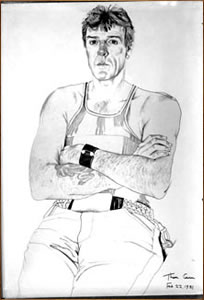
Thom Gunn (29 augustus 1929 – 25 april 2004)
Portret door Don Bachardy, 1981
De Belgische dichter en schrijver Maurice Maeterlinck werd geboren op 29 augustus 1862 in Gent. Zie ook mijn blog van 29 augustus 2006 en ook mijn blog van 29 augustus 2007 en ook mijn blog van 29 augustus 2008 en ook mijn blog van 29 augustus 2009.
Uit: The Double Garden (Vertaald door Alexander Teixeira De Mattos)
„ I HAVE lost, within these last few days, a little bull-dog. He had just completed the sixth month of his brief existence. He had no history. His intelligent eyes opened to look out upon the world, to love mankind, then closed again on the cruel secrets of death.
The friend who presented me with him had given him, perhaps by antiphrasis, the startling name of Pelléas. Why rechristen him? For how can a poor dog, loving, devoted, faithful, disgrace the name of a man or an imaginary hero?
Pelléas had a great bulging, powerful forehead, like that of Socrates or Verlaine; and, under a little black nose, blunt as a churlish assent, a pair of large hanging and symmetrical chops, which made his head a sort of massive, obstinate, pensive and three-cornered menace. He was beautiful after the manner of a beautiful, natural monster that has complied strictly with the laws of its species. And what a smile of attentive obligingness, of incorruptible innocence, of affectionate submission, of boundless gratitude and total self-abandonment lit up, at the least caress, that adorable mask of ugliness! Whence exactly did that smile emanate? From the ingenuous and melting eyes? From the ears pricked up to catch the words of man? From the forehead that unwrinkled to appreciate and love, or from the stump of a tail that wriggled at the other end to testify to the intimate and impassioned joy that filled his small being, happy once more to encounter the hand or the glance of the god to whom he surrendered himself?
Pelléas was born in Paris, and I had taken him to the country. His bonny fat paws, shapeless and not yet stiffened, carried slackly through the unexplored pathways of his new existence his huge and serious head, flat-nosed and, as it were, rendered heavy with thought.
For this thankless and rather sad head, like that of an overworked child, was beginning the overwhelming work that oppresses every brain at the start of life. He had, in less than five or six weeks, to get into his mind, taking shape within it, an image and a satisfactory conception of the universe. Man, aided by all the knowledge of his own elders and his brothers, takes thirty or forty years to outline that conception, but the humble dog has to unravel it for himself in a few days: and yet, in the eyes of a god, who should know all things, would it not have the same weight and the same value as our own?”
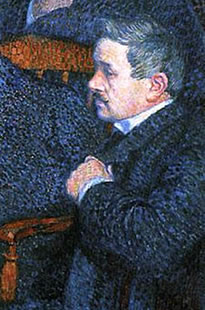
Maurice Maeterlinck (29 augustus 1862 – 6 mei 1949)
Detail uit “De lezing” van Theo van Rysselberghe
De Zwitserse schrijver Lukas Hartmann (eig. Hans-Rudolf Lehmann) werd geboren op 29 augustus 1944 in Bern. Zie ook mijn blog van 29 augustus 2007 en ook mijn blog van 29 augustus 2008 en ook mijn blog van 29 augustus 2009.
Uit: Die Deutsche im Dorf
“Mein Vater, ein hochgewachsener und strenger Mann, unterrichtete während beinahe vier Jahrzehnten die siebte bis neunte Klasse von Tannwiler. Als lediger Junglehrer hatte er zuerst ein Zimmer im Dorf gemietet und war dann, nach der Heirat mit der Tochter eines Sägereibesitzers, ins Häuschen unterhalb des Schulhauses gezogen. Dort wurde ich geboren, dort wuchs ich auf, dort lernte ich Geige spielen. Das Geigenspiel wurde später zu meinem Beruf.
Oft habe ich mein Schicksal verwünscht, Lehrersohn zu sein. Von Lehrerkindern erwartet man, dass sie gute und angepasste Schüler sind; genau dafür werden sie dann verachtet und verspottet. Wenn sie aber aufmucken, heißt es gleich, ein Lehrerkind solle dem eigenen Vater keine Schande machen. Ich gehörte lange zur ersten Sorte, zu den Stillen und Unauffälligen, und hatte darunter zu leiden, dass ich mich an einfältigen Streichen nicht beteiligen mochte. Das änderte sich erst, als ich mich am Ende der vierten Klasse mit Christian, dem Sohn des Posthalters, verbündete. Er war ein Einzelgänger wie ich, aber zarter in der Konstitution, schweigsam und empfindlich. Er las viel, interessierte sich für Geschichte, für Ausgrabungen und Monumente, während ich damals Musik und Malerei entdeckte und stundenlang in den Kunstbänden meines Vaters schmökerte. Wir hatten beide, in den Augen unserer bäuerlichen Klassenkameraden, absonderliche Interessen.
Christian war erst im Lauf der vierten Klasse nach Tannwiler gekommen. Ich hatte ihn an seinem Fensterplatz wochenlang beobachtet, bevor ich ihn anzusprechen wagte. Ich war fasziniert von seinem Profil, das einem bestimmten Kinderbild aus einem der Kunstbände glich; ich konnte nicht wegsehen, wenn am späten Morgen die Sonne den Flaum in seinem Nacken schimmern ließ. Es war derselbe Flaum, den ich später auch an Christians Schwester Barbara entdeckte, als ich zum ersten Mal ihre seidenen Haare aus dem Nacken hob und die Haut darunter berührte; der Flaum reichte, kaum erkennbar, den Rücken hinunter und lief in einer zarten Spitze aus. Aber das war viel später.“
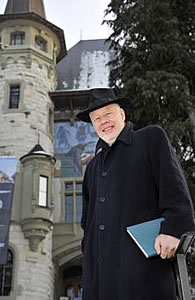
Lukas Hartmann (Bern, 29 augustus 1944)
De Engelse dichter, schrijver en activist Edward Carpenter werd geboren op 29 augustus 1844 in Hove, in de buurt van Brighton. Zie ook mijn blog van 29 augustus 2008 en ook mijn blog van 29 augustus 2009.
TOWARDS DEMOCRACY
PART ONE
The sun, the moon and the stars, the grass, the water that flow,
round the earth, and the light air of heaven:
To You greeting. I too stand behind these and send you word
across them.
I
Freedom at last!
Long sought, long prayed for – ages and ages long:
The burden to which I continually return, seated here thick-
booted and obvious yet dead and buried and passed into heaven,
unsearchable;
[How know you indeed but what I have passed into you?]
And Joy, beginning but without ending-the journey of
journeys – Thought laid quietly aside:
These things I, writing, translate for you – I wipe a mirror and
place it in your hands.
II
The sun shines, as of old; the stars look down from heaven; the
moon, crescent, sails in the twilight; on bushy tops in the warm
nights, naked, with mad dance and song, the earth-children address
themselves to love;
Civilisation sinks and swims, but the old facts remain – the sun
smiles, knowing well its strength.
The little red stars appear once more on the hazel boughs,
shining among the catkins; over waste lands the pewit tumbles
and cries as at the first day; men with horses go out on the land
– they shout and chide and strive – and return again glad at
evening; the old earth breathes deep and rhythmically, night and
day, summer and winter, giving and concealing herself.
I arise out of the dewy night and shake my wings.
Tears and lamentations are no more. Life and death lie stretched
below me. I breathe the sweet aether blowing of the breath of God.
Deep as the universe is my life – and I know it; nothing can
dislodge the knowledge of it; nothing can destroy, nothing can
harm me.
Joy, joy arises – I arise. The sun darts overpowering piercing
rays of joy through me, the night radiates it from me.
I take wings through the night and pass through all the wildernesses
of the worlds, and the old dark holds of tears and death –
and return with laughter, laughter, laughter:
Sailing through the starlit spaces on outspread wings, we two –
0 laughter! laughter! laughter!
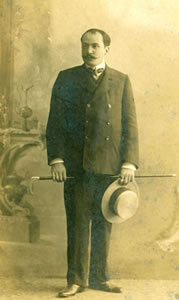
Edward Carpenter (29 augustus 1844 – 28 juni 1929)
De Nederlandse dichteres en beeldend kunstenares Elma van Haren werd geboren in Roosendaal op 29 augustus 1954. Zie ook mijn blog van 29 augustus 2009.
Het schitterende
…En met de geur van water in de schaduw, een groene.
Ik kantelde de bemoste stenen om
de zilvervisjes weg te zien glibberen.
Het was een droom over het plezier van het omkeren,
die wetenschap dat je van alle kanten…
en dan toch niet verloren raken!
De vrijheid om vanuit elk opzicht het uitzicht…
Zoals dieren ruiken dat het gaat regenen, terwijl
de lucht nog blauw is. Ja,
dat moest ik beter begrijpen.
Ook wolken behoren tot het landschap.
Niet altijd denken dat omhoog kijken meteen
het zwaard naar beneden laat suizen.
Het was een droom over kristalhelderheid,
waarin ik mijn eigen bewegingen zag,
die ik maakte in slaap.
Een slaapvattend mij.
Eerst een slaapdronken ademen en dan
het kneden van droom door de hersens
om met veel zuurstof wakker te worden.
Uit bed gesprongen om vlug in de spiegel
te zien wat erin zat die dag.
De zilvervisjes, die van onder uit de slaap
naar boven waren geschoten door mijn gezicht
en zich hadden verborgen in de schaduw bij de mond
de ogen de haargrens.
Ik telde mijn geld
en liep in de dag
met een zilvergezicht.
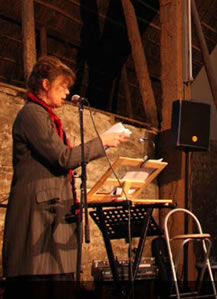
Elma van Haren (Roosendaal, 29 augustus 1954)
De Zwitserse dichter, schrijver en vertaler Herbert Meier werd op 29 augustus 1928 in Solothurn geboren. Reeds op school begon hij gedichten en stukjes schrijven. Hij studeerde literatuur, geschiedenis, filosofie en kunstgeschiedenis in Bazel, Wenen, Parijs en Fribourg, en sloot zijn studie af met een proefschrift over de toneelstukken van Ernst Barlach. Hij is opgeleid als acteur bij Ernst Ginsberg. Hij werkte als redacteur in Parijs en Poitiers, en was als toneelschrijver en acteur bij het Städtebundtheater Biel / Solothurn actief. Van 1977 tot 1982 was hij de belangrijkste toneelschrijver van het Schauspielhaus in Zürich. Aan de universiteiten van Sankt Gallen en Zürich doceerde hij drama en hij werd benoemd in 1986 als schrijver in residence aan de University of Southern California in Los Angeles. Van 1994 tot 1998 was hij gastheer van de show “Sternstunde Philosophie” op de Zwitserse televisie. Sinds 1955 werkt hij als freelance schrijver en vertaler in Zürich.
Wie kann einer sagen
Sieben Gedichte
1
Wie kann einer sagen -:
»Während Sonnen sterben,
vergehen meine Worte nicht»?
Aus dem Tod der Gestirne
entspringt Lebendiges, fraglos;
Vergleichbares erleidet die Sprache:
im Vergessen
vergehen die Worte nicht,
vielmehr –
sie kommen,
von fernen Sonnenwinden getrieben,
erneut zu uns herab.
Und sind zuweilen wie im Anfang.
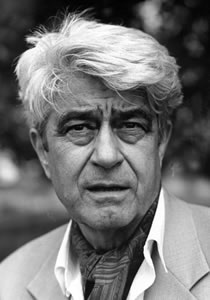
Herbert Meier (Solothurn, 29 augustus 1928)
De Nederlandse dichter, schrijver en criticus Jacques Kruithof werd geboren in Rotterdam op 29 augustus 1947. Zie en ook mijn blog van 29 augustus 2009.
Uit: II Herman Gorter
“Ik zou zoo graag de wereld beelden
Ik zou zoo graag de wereld beelden,
de menschen hoe ze nu groeien
naar de Eenheid, met al hare weelde
zou ik ze doen wille’ opbloeien,
als bloemen van muziek.
Verzen (1928)
1
Iemand die van Herman Gorter helemaal niets af weet, kan een encyclopedie of een literatuurgeschiedenis opslaan, en leert dan, behalve de jaartallen 1864-1927, dat er vier dichters naar die naam hebben geluisterd: de maker van Mei, de enige echte sensitivist, een volgeling van Spinoza, en een doorgewinterde communist. Aan dat vierkoppige beeld verandert, wanneer zo’n lezer zich verder in de figuur verdiept, en een hele boekenkast vol studies en artikelen door worstelt, betrekkelijk weinig. Het kwartet wordt soms tot een tweetal teruggebracht: er was eerst de Tachtiger Gorter; na een crisis, gemarkeerd door de Kenteringssonnetten van 1891-1893, werd hij de dichter van een Idee, en uiteindelijk marxist – nog altijd een Januskop. Meestal komt daar een waardering aan te pas: sommigen (Coster, Prinsen hielden het ervoor dat de tweede Gorter een ondermaats poëet was, anderen (Brandt Corstius, Van Ravesteijn vonden dat het eerst met het dichtwerk van de latere Gorter menens werd.”
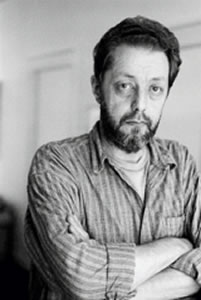
Jacques Kruithof (29 augustus 1947 – 7 maart 2008)
De Algerijnse dichter en schrijver Djamel Amrani werd geboren in Sour El-Ghozlane op 29 augustus 1935. Zie ook mijn blog van 29 augustus 2009.
Je me lave
Je me lave
à la décrue de toutes
les colères
Paisible mon sommeil
redevient délire
de labours
abri de tous les coeurs
multitude apprivoisée
Ma voix se brise
sur le rivage de nos amours
buissonnières
sur la verrière
dérobée à ta mesure
Que cherche-t-il cet automne
trop tôt venu
ce taillis de pierres précaires
en notre demeure secrète
en notre mémoire calcinée
La halte qui me délivre
et la fugue
qui m’insonore
Bruisse la mer
Bruisse la mer
L’odeur de l’été
colle à mes désirs
Sang enténébré
te voilà ravivé
identique
à
la saturation
du Poème.
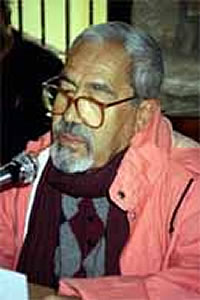
Djamel Amrani (29 augustus 1935 – 2 maart 2005)
De Franse schrijver en criticus Valery Nicolas Larbaud werd geboren op 29 augustus 1881 in Vichy. Zie ook mijn blog van 29 augustus 2009.
Uit: James Joyce
„Depuis deux ou trois ans James Joyce a obtenu, parmi les gens de lettres de sa génération, une notoriété extraordinaire. Aucun critique ne s’est encore occupé de son œuvre et c’est à peine si la partie la plus lettrée du public anglais et américain commence à entendre parler de lui ; mais il n’y a pas d’exagération à dire que, parmi les gens du métier, son nom est aussi connu et ses ouvrages aussi discutés que peuvent l’être, parmi les scientifiques, les noms et les théories de Freud ou de Einstein. Là, il est pour quelques-uns le plus grand des écrivains de langue anglaise actuellement vivants, l’égal de Swift, de Sterne et de Fielding, et tous ceux qui ont lu son Portrait de l’Artiste dans sa Jeunesse s’accordent, même lorsqu’ils sont de tendances tout opposées à celles de Joyce, pour reconnaître l’importance de cet ouvrage ; tandis que ceux qui ont pu lire les fragments d’Ulysse publiés dans une revue de New-York en 1919 et 1920 prévoient que la renommée et l’influence de James Joyce seront considérables. Cependant, si, d’autre part, vous allez demander à un Membre de la « Société (américaine) pour la Suppression du Vice » : Qui est James Joyce ? Vous recevrez la réponse suivante : C’est un Irlandais qui a écrit un ouvrage pornographique intitulé Ulysse que nous avons poursuivi avec succès en police correctionnelle lorsqu’il paraissait dans la Little Review de
New-York.
Il s’est en effet passé pour Joyce aux États-Unis ce qui s’est passé chez nous pour Flaubert et pour Baudelaire. Il y a eu plusieurs procès d’intentés contre The Little Review à propos d’Ulysse. Les débats ont été parfois dramatiques et plus souvent comiques, mais toujours à l’honneur de la directrice de The Little Review, Miss Margaret Anderson, qui a combattu vaillamment pour l’art méconnu et la pensée persécutée.“
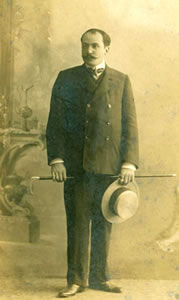
Valery Larbaud (29 augustus 1881 – 2 februari 1957)
